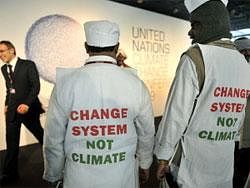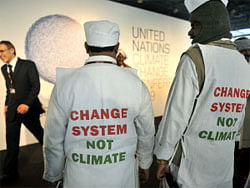

Environment Minister Jairam Ramesh asserted that India's national voluntary domestic measures to tackle global warming were not up for international scrutiny and progress on these would be checked only by the country's Parliament.
He made it clear that India will not agree to the concept of "peaking", a clause incorporated in the first official draft which mandates developing nations to cap their emissions although it does not mention any time-frame for that.
Ramesh said the "peaking" clause will adversely impact the development of rural electricity in the country which is already facing a huge backlog in this area.
While ruling out any dilution of previously-stated "red lines" drawn by India, the minister said he had "come here to play a constructive, facilitative, leadership role to ensure an effective and equitable agreement".
His comments came in the backdrop of a clash between India and the European Union on the contentious issue of making domestic commitments legally-binding and verifiable.
European Commission Director General Karl Falkenberger said last night that EU expected India, China and other emerging economies to report on their national mitigation programmes which would be incorporated in an international treaty.
"We need these contributions from everyone. We need them in a legally-binding manner from everyone. Differentiated commitments, we can accept, but it has to be verifiable," Falkenberger said.
The remarks drew objection from India, with senior negotiator Chandrashekar Dasgupta noting that Falkneberger's position fell short of climate justice.
Sensing a bid to "change the rules of the game", he said India was "seeking climate adequacy and climate justice".
India last week announced a series of climate mitigation steps aimed at reducing emission intensity by 20-25 per cent by 2020 on the 2005 levels. It, however, made it clear that these steps were voluntary and not legally-binding or open to international scrutiny.
Underlining that every human being has an equal right to resources of the atmosphere, Dasgupta said, "therefore you have to take the per capita approach taking also into account the historical emissions."
Pressing for "common but differentiated responsibilities," he said the developed countries must provide finances and technology so that developing countries could fulfil their goals of mitigation.
"That is the question on which the answer has been rather disappointing," he said.
Ramesh said that in all his discussions, the basic objective was to highlight not only what India has done in recent weeks pro-actively, voluntarily but also to underscore the basic positions India will not compromise on even as it engages in constructive negotiations," he said.
Ramesh told journalists here that his discussions were focused on the various drafts of potential treaty from the Working Groups on Kyoto, the African group and Alliance of Island States (AOSIS) that have been circulating at the climate meet here.
India has asserted that every individual has a right to an equal atmospheric space and feels the rich countries are trying to deny this to poorer populations of Asia and Africa.
It says there cannot be an international treaty which creates a group of haves and have-nots.
Meanwhile, the chief climate change negotiator of the tiny Pacific island of Tuvalu today made an emotional appeal for a strong agreement that would legally bind all countries to commitments to control carbon emissions.
Speaking in the main hall of the Bella Centre where the Copenhagen climate change summit is being held, Tuvalu's representative Ian Fry called for two legally binding pacts.
"I woke up this morning crying, and that's not easy for a grown man to admit," Fry said, choking as he spoke in the plenary crowded with hundreds of delegates.
"The fate of my country rests in your hands," he said.
Tuvalu is a small island where people live two meters above sea level and it could be swamped by rising sea levels.
Negotiators from 192 countries have come to Copenhagen to hammer out a climate change treaty as the first commitment period of the Kyoto Protocol expires in 2012.